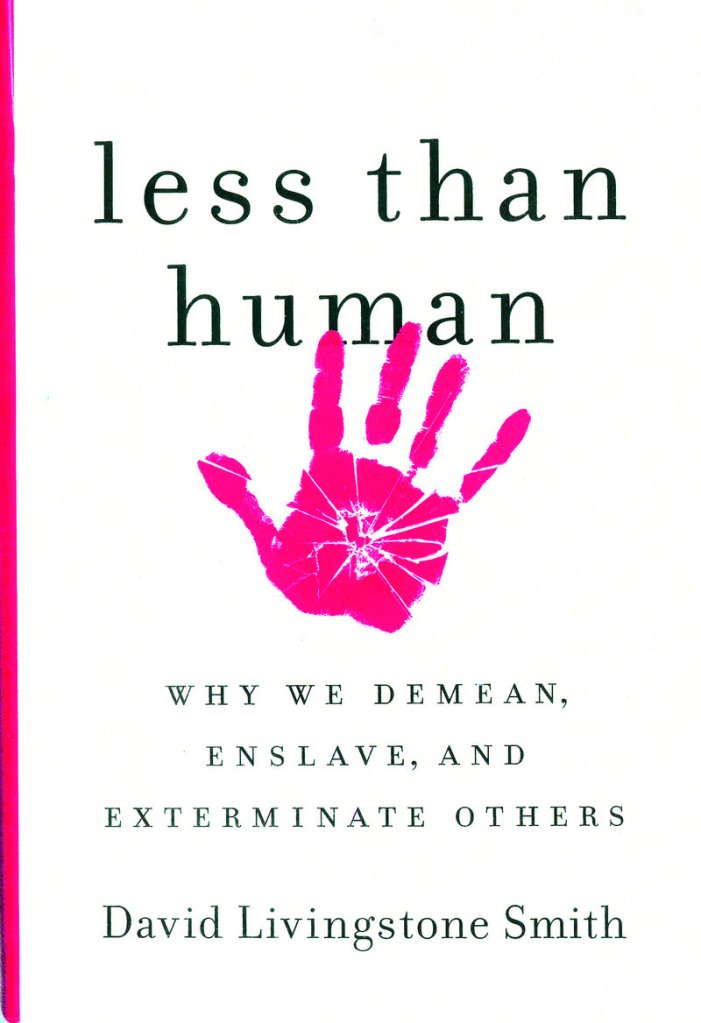Ah, the things we see, or know of, and roundly ignore, or sometimes confront in the pursuit of our own happiness. The things we say about “others” in the heat of the moment. In everyday chit-chat, we hear it, we say it, and we hardly give it a thought. In his incisive new book, “Less Than Human: Why We Demean, Enslave, and Exterminate Others,” Dr. David Smith of the University of New England proves that it has been ever thus.
Although he is a professor of philosophy and co-founder of the New England Institute for Cognitive Science and Evolutionary Psychology, one does not need to read Latin or take a special course to tackle “Less Than Human.” This is not an academic tome. It is a clear almost sprightly book, if not for the subject. It engages any level of reader willing to take it up.
Right at the start, Smith offers vivid examples of how we demean others by making them animals. Once “other” becomes understood as “dog,” “snake,” “soul-less,” “apostate” or “infidel,” we are given liberty to treat them as such. The normal rules of conscience, morality or ethics are, for a time and situation, made not applicable.
Smith is not out to ruin the reader’s holiday or mood with a litany of revolting behavior from the Bible to Rwanda. Those seeking a back story of sickening torture devices from the Crusades to modern times will find a lack of prurient stories and illustrations. This is one book that stays on course with its subtitle and strives to answer “Why We Demean, Enslave, and Exterminate Others.”
The book is concise, well organized and keeps to the argument. For those who want more there are footnotes, appendices and an index. The text includes a preface, “Creatures of a Kind, Somewhat Inferior,” and chapters including: “Less Than Human,” “Steps Toward a Theory of Dehumanization,” “The Rhetoric of Enmity” and “Learning From Genocide.”
If they sound off-putting to the reader, the substance and presentation of each chapter essay is anything but. The author deals with nailing down attitudinal history, convictions long entrenched in each of us. “Dehumanization is neither uniquely European nor uniquely modern,” he notes, “It is far more widespread, vastly more ancient, and more profoundly intertwined with the human experience…” Walt Kelly’s famous line comes to mind; “We have met the enemy and he is us.” In real terms, we find novelist-witness Slovenka Drakuli in watching the trial of Balkan war criminals of our time: “If ordinary people committed war crimes, it means that any of us could commit them. Now you understand why it is so easy and comfortable to accept that war criminals are monsters.”
Smith continues: “Calling these people ‘monsters’ merely dehumanizes the dehumanizers and thus becomes a symptom of the disease for which it purports to be the diagnosis.”
Though I believe that the mechanics of what Smith sets out to describe have been amply demonstrated, changing our behavior is more problematic. Smith asks “if our future can be less hideous than our past”? Then he answers thinly that, “Nobody knows because nobody’s ever tried.” As a reviewer I urge everyone to read and wrestle with this all-consuming key work.
William David Barry is a local historian who has authored/co-authored six books including “Deerring: A Social and Architectural History” and the novel “Pyrrhus Venture.” He lives in Portland.
Copy the Story Link
Send questions/comments to the editors.



Success. Please wait for the page to reload. If the page does not reload within 5 seconds, please refresh the page.
Enter your email and password to access comments.
Hi, to comment on stories you must . This profile is in addition to your subscription and website login.
Already have a commenting profile? .
Invalid username/password.
Please check your email to confirm and complete your registration.
Only subscribers are eligible to post comments. Please subscribe or login first for digital access. Here’s why.
Use the form below to reset your password. When you've submitted your account email, we will send an email with a reset code.